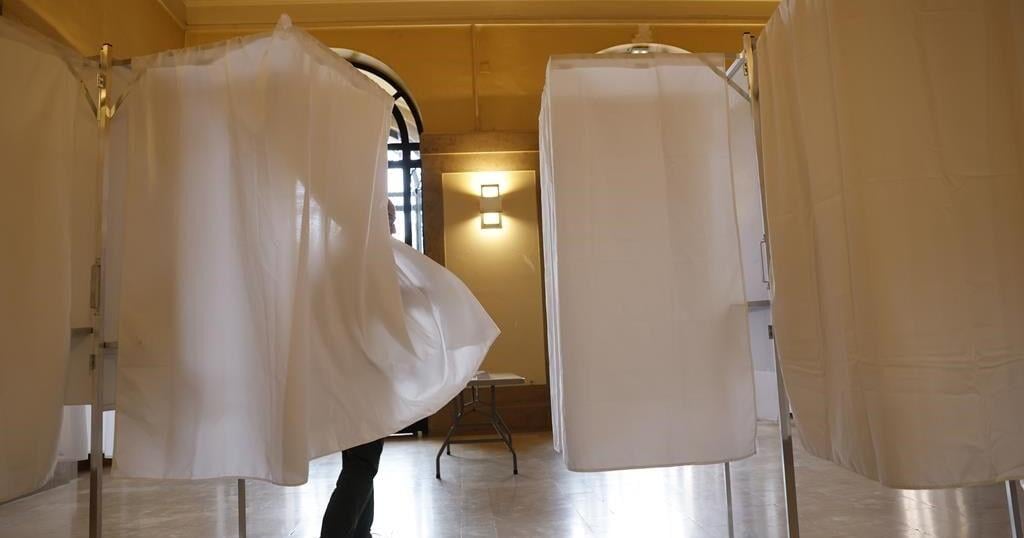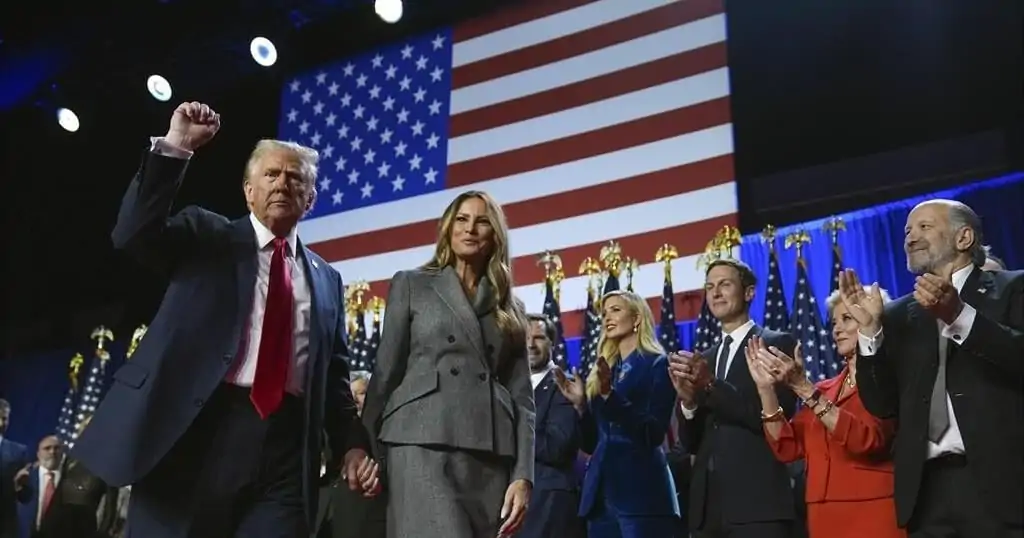PARIS (AP) — A coalition of the French left won the most seats in high-stakes legislative elections Sunday, according to near-final results, beating back a far-right surge but failing to win a majority. The outcome left France facing the stunning prospect of a hung parliament and threatened political paralysis in a pillar of the European Union and Olympic host country.
That could rattle markets and the French economy, the EU’s second-largest, and have far-ranging implications for the war in Ukraine, global diplomacy and Europe’s economic stability.
In calling the election on June 9, after the far right surged in French voting for the European Parliament, Macron said sending voters back to the ballot boxes would provide “clarification.”
On almost every level, that gamble appears to have backfired. Results so far showed France plunged into a political fog, with the three main blocs — a leftist coalition, the far-right National Rally and Macron’s centrists — all falling well short of the 289 seats needed to control the 577-seat National Assembly.
“Our country is facing an unprecedented political situation and is preparing to welcome the world in a few weeks,” said Prime Minister Gabriel Attal, who plans to offer his resignation on Monday.
With the Olympics looming, he said he was ready to stay at his post “as long as duty demands.” Macron has three years remaining on his presidential term.
Attal made clearer than ever his disapproval of Macron’s shock decision to call the election, saying “I didn’t choose this dissolution” of the outgoing National Assembly, where the president’s centrist alliance used to be single biggest group, albeit without an absolute majority. Still, it was able to govern for two years, pulling in lawmakers from other camps to fight off efforts to bring it down.
The new legislature appears shorn of such stability. With most ballots counted, the leftist coalition was leading Macron’s centrist alliance, with the far right in third. That confirms the picture also given by pollsters’ projections.
In Paris’ Stalingrad square, supporters on the left cheered and applauded as projections showing the alliance ahead flashed up on a giant screen. Cries of joy also rang out in Republique plaza in eastern Paris, with people spontaneously hugging strangers and several minutes of nonstop applause after the projections landed.
Marielle Castry, a medical secretary, was on the metro in Paris, when the projections were first announced.
“Everybody had their smartphones and were waiting for the results and then everybody was overjoyed,” said the 55-year-old. “I had been stressed out since June 9 and the European elections. … And now, I feel good. Relieved.”
A redrawn political map
Even before votes were cast, the election redrew France’s political map. It galvanized parties on the left to put differences aside and join together in a new alliance, the New Popular Front, behind pledges to roll back many of Macron’s headline reforms, embark on a massively costly program of public spending and, in foreign policy, take a far tougher line against Israel because of the war with Hamas.
Macron described the left’s coalition as “extreme” and warned that its economic program of many tens of billions of euros in public spending, partly financed by tax hikes for high earners and on wealth, could be ruinous for France, already criticized by EU watchdogs for its debt.
Yet, with the projections and then the near-final results showing the New Popular Front with the most seats, its leaders immediately pushed Macron to give the alliance the first chance to form a government and propose a prime minister to share power with the president.
The most prominent of the leftist coalition’s leaders, Jean-Luc Mélenchon, said it “is ready to govern.”
Although the National Rally fell far short of its hopes of securing an absolute majority that would have given France its first far-right government since World War II, the anti-immigration party with historical links to antisemitism and racism was on track to have more seats than ever in the National Assembly.
After the party finished top of the first-round vote last weekend, its rivals worked together to dash its hopes of an outright victory in Sunday’s runoff, by strategically withdrawing candidates from many districts. That left many far-right candidates in head-to-head contests against just one opponent, making it harder for them to win.
Many voters decided that keeping the far right from power was more important to them than anything else, backing its opponents in the second round, even if they weren’t from the political camp they usually support.
National Rally leader Marine Le Pen, thought to be eyeing what would be her forth run for the French presidency in 2027, said the elections laid the groundwork for “the victory of tomorrow.”
“The tide is rising,” she said. “It did not rise high enough this time.”
“The reality is that our victory is only deferred,” she added.
Jordan Bardella, Le Pen’s 28-year-old protégé who’d been hoping to become prime minister, rued that the outcome of the vote “throws France into the arms of the extreme left.”
In a statement from his office, Macron indicated that he wouldn’t be rushed into inviting a potential prime minister to form a government. It said he was watching as results come in and would wait for the new National Assembly to take shape before taking “the necessary decisions.”
Unknown territory
A hung parliament is unknown territory for modern France.
Unlike other countries in Europe that are more accustomed to coalition governments, France doesn’t have a tradition of lawmakers from rival political camps coming together to form a majority. France is also more centralized than many other European countries, with many more decisions made in Paris.
The president was hoping that with France’s fate in their hands, voters might shift from the far right and left and return to mainstream parties closer to the center — where Macron found much of the support that won him the presidency in 2017 and again in 2022.
But rather than rally behind him, millions of voters seized on his surprise decision as an opportunity to vent their anger.
In last weekend’s first round of balloting, voters backed candidates from the National Rally, while the coalition of parties on the left took second and his centrist alliance was a distant third.
The sharp polarization of French politics – especially in this torrid and quick campaign – is sure to complicate any coalition-building effort. Racism and antisemitism marred the electoral campaign, along with Russian disinformation campaigns, and more than 50 candidates reported being physically attacked — highly unusual for France.
___
Associated Press journalists Barbara Surk in Nice, France, and Helena Alves and Alex Turnbull in Paris contributed to this report.
___
Follow AP’s global election coverage at

























